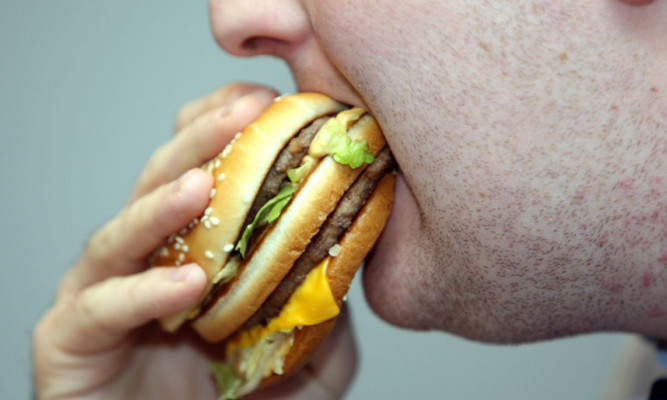The NHS has been left to pick up the pieces of the culture of excess promoted by junk food and alcohol companies, doctors have warned.
The British Medical Association (BMA) in Scotland has aligned with health bodies and the Scottish Government to urge Westminster to introduce tougher licensing for junk food and alcohol advertising.
But the Conservatives accused First Minister Nicola Sturgeon of acting like “a deranged head nanny” trying to stop people being “brainwashed into enjoying themselves”.
Dr Peter Bennie, chairman of the BMA Scotland, said: “The regulation of alcohol and junk food advertising in this country is far too weak, largely because these industries have been allowed to regulate themselves.
“Despite the serious health harms associated with excessive alcohol consumption and obesity in the UK, these industries use marketing to promote consumption of their products.
“The cost of alcohol to our society is significant and, inevitably, the NHS picks up the pieces.
“Obesity rates too are worryingly high, driven by the promotion and availability of unhealthy foods.
“Obesity brings with it increased risk of a wide range of serious life-threatening and chronic diseases. While doctors have a role to play in supporting overweight patients, there is a limit to what they can do.
“The UK Government could take decisive action to change the culture of excess that the junk food and alcohol industry promotes, and tougher regulation of advertising would be a positive first step.”
Barbara O’Donnell, deputy chief executive at Alcohol Focus Scotland, said: “Although current rules prohibit alcohol advertising around children’s programmes, alcohol adverts are allowed during early evening family viewing when the largest number of children watch television.”
Children surveyed were more familiar with alcohol brands than biscuits, crisps and ice cream, she added.
“More effective controls are urgently needed to ensure alcohol marketing messages only reach adult audiences,” said Ms O’Donnell.
Simon Gillespie, chief executive at the British Heart Foundation, said: “Evidence shows that junk food adverts can influence children’s food preferences and consumption, hampering parents’ efforts to get their children to eat healthily. In the UK over 30% of children are overweight or obese and dietary surveys show that children are eating too much salt, sugar and saturated fat.
“The Government must act now to ban junk food marketing before the 9pm watershed to help give children a stronger chance of preventing future heart disease.”
Control over broadcast advertising is reserved to Westminster.
Scottish Public Health Minister Maureen Watt has written to UK Government ministers calling for alcohol and junk food advertising to be prohibited before the 9pm watershed.
“There is a wealth of research which shows that children seeing these adverts while they are watching their favourite family programmes respond positively towards them and they affect their behaviour,” she said.
“That’s something that needs to be addressed.”
Scottish Conservative health spokesman Jackson Carlaw said: “This brainless idea is more evidence of an SNP which thinks state always knows best.
“It can’t think of innovative and practical solutions, so it just seeks to ban things instead.
“Where would this legislation start and end?
“Would the celebrated Irn Bru adverts be denied to viewers who don’t watch beyond 9pm?
“And why stop at adverts? Why not ban TV programmes showing people eating or drinking too?
“Or better still require all food and drink stores to board up their windows so no-one can be brainwashed into enjoying themselves.
“If we want everyone to take a responsible attitude to their health, we need to treat people responsibly.
“It’s not Nicola Sturgeon’s role to act like a deranged head nanny in the SNPs increasingly scary nanny state.”
